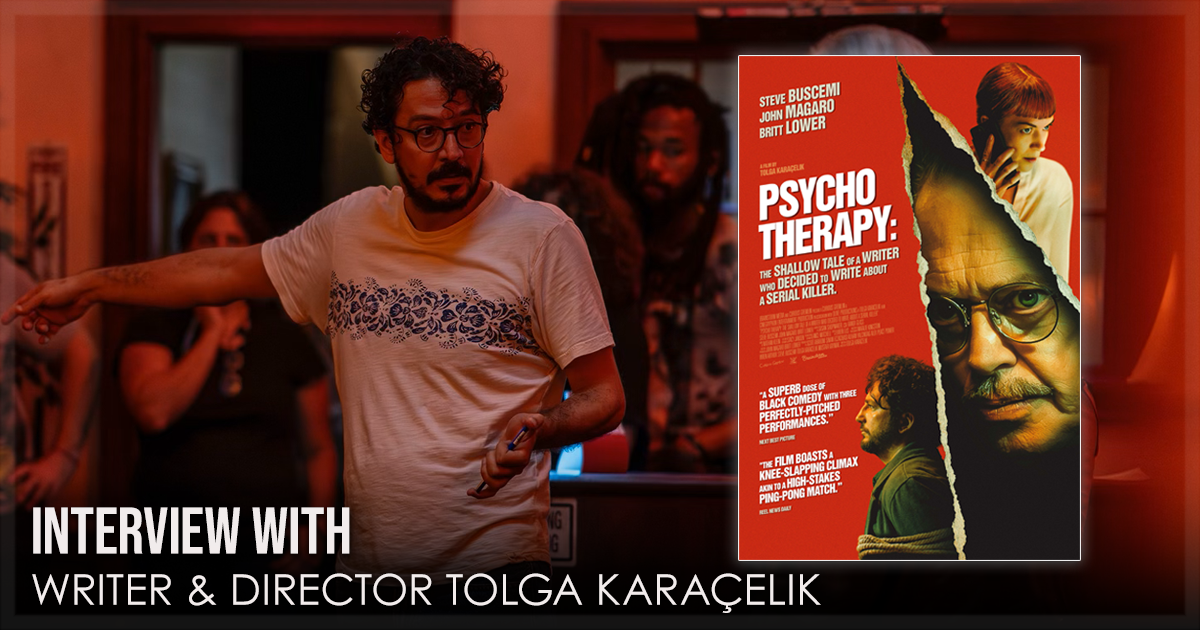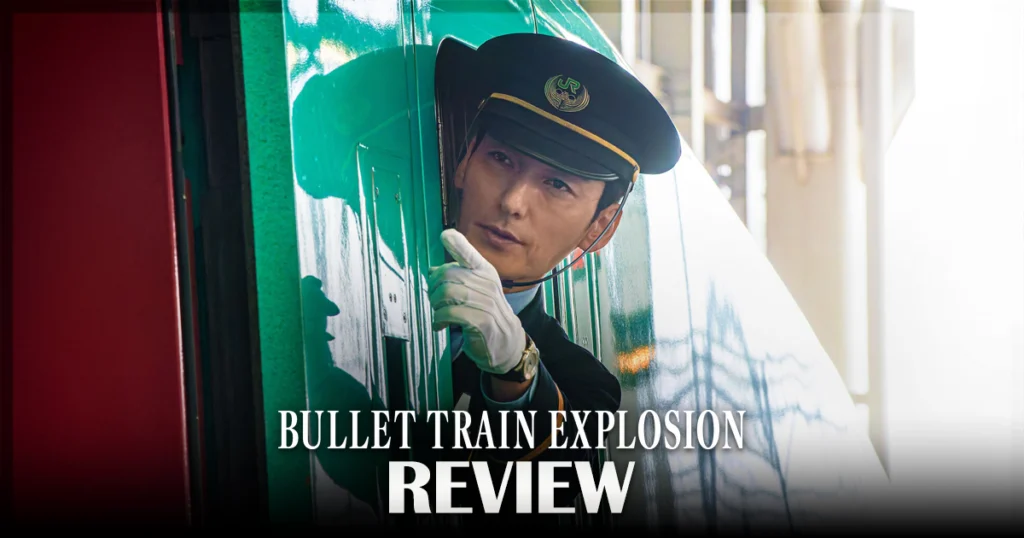Tolga Karaçelik is a name well known to international audiences and soon to be United States audiences as well. Psycho Killer: The Shallow Tale of a Writer Who Decided to Write About a Serial Killer is a black comedy and the writer/director’s fouth film. It’s his latest after the Sundance-lauded Butterflies. Starring a standout Britt Lower, Steve Buscemi, and John Magaro, the story is a black comedy about relationships, fiction and ultimately, believing. Over Zoom, Karaçelik sat down with me to chat about the film, Lower’s Suzie, and more.
The Interview with Tolga Karaçelik, from Psycho Therapy: The Shallow Tale of a Writer Who Decided to Write About a Serial Killer
[Editor’s Note: This interview has been lightly edited for clarity.]
Ayla Ruby: So first congrats because this was just a ton of fun and so it was really great. I couldn’t stop watching.
Tolga Karaçelik: Thank you. Glad you enjoyed it.
Ayla Ruby: So I have a ton of questions, but I guess I’ll start off with, so you wrote this, you directed it. Can you talk about your journey to this story? It’s very different than your other stuff.. and also the idea that you were going to direct it as well.
Tolga Karaçelik: Yeah, yeah. Had you ever watched any of my other stuff?
Ayla Ruby: I started to watch the Netflix show [Yakamoz S-245] and Butterflies.
Tolga Karaçelik: Yeah, Butterflies is my stuff.
Ayla Ruby: It’s similar, but…
Tolga Karaçelik: Yeah, this is my fourth film that I’ve written and directed and partly produced. So the process, I think I started writing this 10 years ago or nine, eight years ago, something like that. I was started taking notes and it was first, the thing that’s different with this one is with the other ones, I always kind of saw it while I was writing. With this one, I was just enjoying it and that’s where that hope feeling of it came from the shallowness that made me ease, which I like Thom Yorke says, I learned not to suffer as an artist. It can be created without suffering, my fourth album he says. And I think it was the same thing with me in my fourth movie. I realized that you don’t have to suffer at all to create something.
Tolga Karaçelik: So yeah, it was a strange journey. It started with only with Kollmick and then I got married also that came into the scene. Then I realized I wanted to make a film about believing to continue being a couple or how do you continue being a couple when there’s a belief it’s gone, et cetera. Faith that faith has gone, I’ve realized that I’m coming back to that same thing, although I have problems with faith that actually I think I’m writing about faith all the time, Butterflies, if you continue watching it, it’s going to be believing in becoming a family also. So I think it has some similarities. Ivy was about believing to be able to live together was a totally different tone. It was a psychological thriller So yeah, I think, I dunno, I don’t want turn into therapy.
Ayla Ruby: Well, I mean that’s one of the themes in the movie that kind of the character who’s a serial killer slash counselor slash It’s an interesting way of describing it. So John Magaro is lovely, Steve Buscemi is very interesting, but I want to talk about Britt Lower because I don’t know, she was the absolute standout for me with this and she was fantastic. Can you talk about how she came on board, how her character, if it evolved when she came on board or anything like that?
Tolga Karaçelik: I think it was love at first sight. We met and then I saw her, I think we met in Brooklyn, was our place over there. And we started talking and it was supposed to be like a half an hour meet or something like that. We ended up, I sitting there two and a half hours and we were laughing and talking. And when you read the script, because she doesn’t have that many lines, people were maybe finding difficulty to understand how important Suzie is. But I was always telling everyone, this is around Susie, what’s going on is around Suzie. As much as, of course Keane also so important because he’s talking too much. But Suzie was kind of like the point that you pinpoint all the movie around her. And so she definitely delivered Suzie so good. I loved working with her and I would definitely work with her in every circumstances
Ayla Ruby: Without her, without that character. This is a very different and without her take on it, this is a very different film I feel like.
Tolga Karaçelik: Yeah, always. My female characters are always named Suzie. For example, in also the Butterflies, it was Suzie again and she has that edge side also. I mean my female characters are called Suzie and my main male characters are called usually Kenan. This time it’s had been Tom Keane with the same letters. So she’s a second Suzie and she made it her own.
Ayla Ruby: So this is obviously an English language film. Was it very different kind of directing this and approaching this versus butterflies or versus something that is in Turkish?
Tolga Karaçelik: I’m usually known as the actor’s director back there and I love working with actors, but being on the set was totally the same. But when I get excited, when I like something or when I have to intervene at that moment, those were the hard parts because I’m trying to find the right words, not misleading them. So can you not fight for 10 minutes, think not misleading them? And you might be saying meaning something totally different and with a ethos of the words of the time, et cetera, of the modern streets English, it might mean totally something different. So that was the hard part. I think it took both sides, the same kind of effort to communicate me trying to explain them, trying to understand. So it was a two sided road and I think we did good.
Ayla Ruby: Yeah, no, it’s fantastic. It’s just a delightful film. So was there anything that was kind of really difficult to accomplish or pull off? You’ve got a llama in a bar, some very, you’ve got tense moments and then there’s still comedy. I don’t know, it just, there’s a lot. What was the hardest thing to do?
Tolga Karaçelik: I think I was in Florence. I was looking at this painting between Siena and Florence, the war between the cities. I think it’s also in The Da Vinci Code, the same picture, the painting. And I realized that till then I was trying to hide myself. Always this age gives you the feeling that you have to be intellectual to become an artist. I don’t believe in that.
Tolga Karaçelik: About feelings. I realized in that painting that I was looking at, I was feeling, so I never decided not to hold myself back, not to pretend like I am being something intellectual. And that’s more important than the heart. No, I want the audience to feel something while they’re watching it. Usually when we feel too much, we think that it might be shallow a little bit. It doesn’t have the intellectual size that’s needed. I think we were all grown up with Kurt Cobain and the melancholy that the artist should be a little bit grim and backwards and it can be something really joyful aloud and with lots of feelings and still mean something. It might have still depth although it has too much smiling face or to little stuff like that. So that’s what I try to achieve.
Ayla Ruby: Oh, that’s fantastic. And I know we’re starting to get close to the end of our time. Is there anything else you want people to know about this film or your work or anything you’re working on in the future?
Tolga Karaçelik: I don’t decide. I think the story stays with me and then whatever story, it becomes my next film. So I got a couple of things that I’m writing in English, a couple of things that I’m writing in Turkish, but I don’t know which will stay and I won’t shoot anything I believe that it should be shot.
Tolga Karaçelik: I’m not a career person, so I don’t know what will happen if I don’t have any stories, I won’t shoot any movies.
Ayla Ruby: That makes a lot of sense. Thank you very much.
Tolga Karaçelik: Thank you.
Psycho Therapy: The Shallow Tale of a Writer Who Decided to Write About a Serial Killer is now available on digital and on demand.
You might also like…
‘Bullet Train Explosion’ Film Review: Visually Sharp, Strong Direction, Narratively Safe


